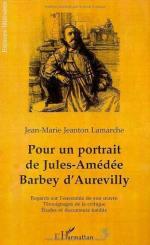|
This section contains 1,031 words (approx. 4 pages at 300 words per page) |

|
SOURCE: "Barbey D'Aurevilly," in The New York Times Book Review, March 29, 1925, pp. 16, 22.
In the following excerpt, the critic finds Barbey's stories in The Diaboliques derivative.
In spite of Lamartine's fine title for him—"the Duc de Guise of Literature"—the French church militant has shown no disposition to claim Barbey d'Aurevilly as an asset. An aura of disreputability has always clung around his truculent professions of faith, mingled as they were with "hysteria, sadism and diablerie." It has always been hard to resist a suspicion that, for a man of so many attitudes, they were only one pose the more. Something of the old suspicion must also attach to a personal legend so sedulously created in advance and adorned so lavishly with arabesques of eccentricity. His titles to nobility, to begin with, were fictitious ones. Sir Edmund Gosse, in his prefatory study to [a] translation of Les Diaboliques...
|
This section contains 1,031 words (approx. 4 pages at 300 words per page) |

|


